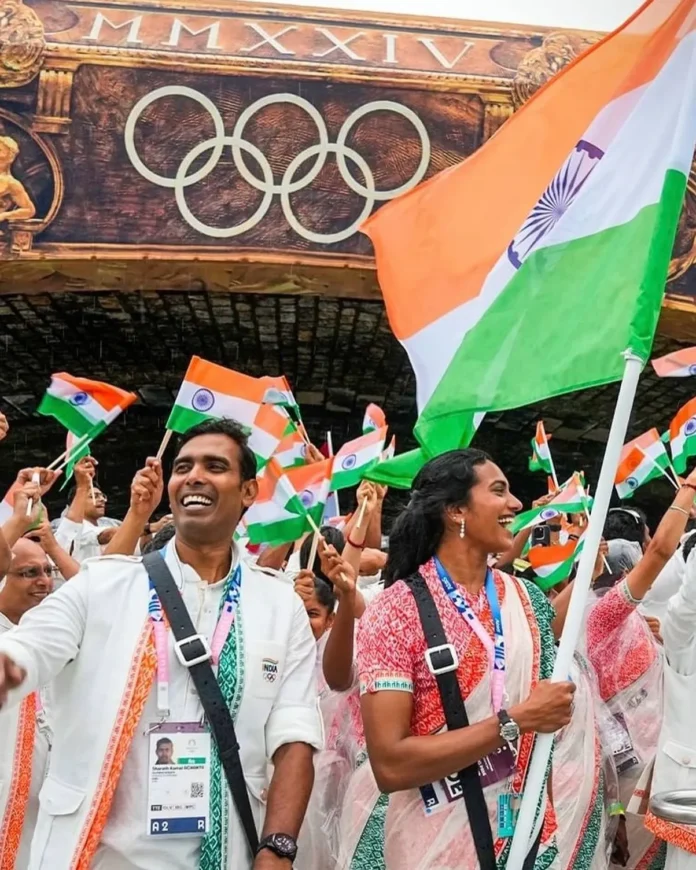India is pitching to host a future edition of the Summer Olympic Games, and while the ambition is bold and backed by strong political will, the International Olympic Committee (IOC) has raised red flags over several critical issues: anti-doping compliance, sports governance, and overall athletic performance.
The message is clear: India must clean up its sporting house before it can welcome the world to its doorstep.
This comes at a pivotal moment in India’s sporting journey. As the nation gears up for the 2028 and 2032 Games with increased investment and grassroots programs, its long-standing systemic issues could become stumbling blocks on the road to Olympic hosting rights.
India’s Olympic Hosting Dream
India has officially expressed interest in hosting the 2036 Summer Olympics, with Ahmedabad being touted as the frontrunner city. The pitch, endorsed by the Indian Olympic Association (IOA) and supported by the central government, highlights India’s infrastructure progress, growing youth demographic, and its place as one of the world’s fastest-growing economies.
The Indian government’s commitment to sports development has grown significantly over the last decade:
-
The Khelo India initiative targets grassroots development.
-
A surge in sports budget allocation post-2016 Rio Olympics.
-
Private leagues (like IPL, ISL, Pro Kabaddi) enhancing athlete earnings and public engagement.
But for all the optimism, the IOC’s concerns serve as a sobering reminder that grandeur must be matched with integrity and accountability.
IOC’s Red Flags: What’s Holding India Back?
1. Doping Scandals
India consistently ranks among the top five countries for anti-doping rule violations. The World Anti-Doping Agency (WADA) has flagged India’s doping record multiple times.
-
In the 2023 WADA report, India was second only to Russia in total violations.
-
The National Anti-Doping Agency (NADA) has faced criticism for insufficient education programs and weak enforcement.
-
Multiple athletes from track and field, weightlifting, and wrestling have tested positive in recent years.
IOC President Thomas Bach recently remarked:
“Anti-doping is a foundational pillar of fair play. A nation aspiring to host the Games must set a global example—not be among the violators.”
India has since promised reform, including:
-
Digitizing testing processes
-
Strengthening the NADA framework
-
Collaborating with WADA for compliance audits
But it remains to be seen whether these reforms will produce results in time.
2. Sports Governance & Transparency
India’s sports governance is riddled with bureaucracy, infighting, and a lack of transparency. Recent instances include:
-
IOA’s internal rift over president elections in 2022
-
Frequent suspension threats by international federations (e.g., wrestling, boxing)
-
State interference in athlete selections and training appointments
In December 2022, the International Boxing Association (IBA) suspended India’s federation due to governance failures. Similarly, the Wrestling Federation of India (WFI) has been in turmoil over abuse allegations and administrative inaction.
IOC requires host nations to operate autonomous sports bodies free from political interference. India’s record so far raises doubts about its readiness on that front.
3. Athletic Performance at the Global Stage
While India is making steady progress in sports like wrestling, badminton, and shooting, its overall Olympic medal tally remains modest.
-
In Tokyo 2020, India won 7 medals, including a historic gold in javelin by Neeraj Chopra.
-
By comparison, nations with similar population sizes (like the US and China) bring home dozens to hundreds of medals consistently.
IOC members view strong domestic athletic performance as a measure of a nation’s commitment to Olympic ideals. While India’s trajectory is upward, it must accelerate elite athlete development across multiple disciplines to match its ambitions.
Ahmedabad: The Proposed Olympic City
Ahmedabad, located in Gujarat, is the centerpiece of India’s Olympic pitch. The Sardar Vallabhbhai Patel Sports Enclave, currently under construction, is being positioned as the primary venue for the games.
Key features include:
-
A 110,000-capacity stadium, currently the largest cricket stadium in the world
-
Olympic-grade aquatic and track-and-field facilities
-
Planned athlete villages and media centers
-
Connectivity via high-speed rail, metro, and airports
The city also enjoys strong political backing from both the state and central governments. This institutional support is critical in large-scale infrastructure projects, a lesson learned from previous hosts like Rio and Athens, where delays and overruns became issues.
India’s Strategic Playbook: Soft Power Through Sports
India’s push to host the Olympics isn’t just about athletics—it’s a geopolitical and economic strategy. As the world’s most populous nation and a rising global power, India is leveraging soft power through major international events:
-
Hosted the G20 Summit in 2023
-
Successfully pulled off the 2023 Cricket World Cup
-
Bidding for the 2029 Asian Games
Hosting the Olympics would put India in the same league as China (Beijing 2008), Brazil (Rio 2016), and Russia (Sochi 2014) in showcasing its modernization to the global stage.
What Does the IOC Want?
IOC’s feedback isn’t intended to dissuade, but to guide. The Committee has laid out key expectations for India’s Olympic bid:
-
Strengthen anti-doping compliance
-
Reform governance and uphold independence of sports bodies
-
Increase transparency in athlete selection and funding
-
Develop a sustainable, legacy-driven Olympic plan
-
Foster broader participation across all Olympic disciplines
As one senior IOC delegate put it:
“India has passion and potential. What it needs now is a system built on ethics, performance, and planning.”
Athlete Voices & Public Sentiment
Indian athletes have welcomed the prospect of a home Olympics but echo concerns over system inefficiencies.
✦ Neeraj Chopra:
“Competing in front of our people at home would be a dream. But we also need to ensure we are ready—not just in stadiums but in support systems.”
✦ PV Sindhu:
“We’ve come a long way in sports, but issues like doping and unfair selection still bother athletes. Fixing that will make us truly ready for the Olympics.”
Public support for the Olympics is strong, with youth-led movements on social media amplifying calls for sporting reforms and Olympic readiness.
Lessons from Other Host Nations
Brazil (Rio 2016)
Faced similar concerns around governance and corruption. The post-Olympics economic fallout still haunts the country.
China (Beijing 2008)
Used the Olympics to showcase infrastructure and geopolitical might—but faced criticism on human rights and transparency.
France (Paris 2024)
Emphasizing sustainability, inclusivity, and minimalism—an approach India is also studying.
India’s Recent Progress: Cause for Optimism
Despite criticisms, India has achieved several notable milestones recently:
-
WADA declared NDTL (National Dope Testing Lab) compliant after years of suspension.
-
Government increased sports funding by 40% since 2020.
-
Successful hosting of international multisport events (Youth Games, Commonwealth trials).
-
Growth in private sports academies and talent pipelines.
This momentum, if sustained, could help India meet IOC’s benchmarks in time for the final bidding rounds.
Frequently Asked Questions (FAQs)
❓Is India officially confirmed to host the 2036 Olympics?
Not yet. India has expressed interest, and Ahmedabad is its proposed city. The IOC is evaluating bids and concerns before making a decision, likely post-2026.
❓What are IOC’s concerns with India?
Mainly doping violations, poor sports governance, and inconsistent athletic performance across Olympic disciplines.
❓Why is Ahmedabad being considered for the Olympics?
The city is building the Sardar Vallabhbhai Patel Sports Enclave, a massive, modern complex intended to meet Olympic standards. It also has political and infrastructural support.
❓Has India hosted any Olympic Games before?
No. India has never hosted the Olympics, though it has hosted other major events like the Commonwealth Games (2010), Asian Games (1951, 1982), and World Cups in various sports.
❓Is India addressing doping issues?
Yes. Recent reforms include enhanced digital testing, more athlete education, and collaboration with international anti-doping agencies.
❓When will the 2036 host city be announced?
The IOC is expected to finalize the decision after the 2026 Winter Olympics, once all assessments are complete.
Read More: gimki.com join
Conclusion: A Bold Bid With Real Challenges
India’s Olympic dream is bold, visionary, and potentially transformative—not just for sports, but for national pride, infrastructure, and global perception.
But vision must meet verification.
The IOC’s concerns are not roadblocks—they’re road signs. If India can address doping, governance, and systemic inefficiencies in time, it won’t just earn the right to host the Olympics. It will prove that it belongs at the very heart of global sport.
As the tricolor flutters with ambition, only time—and reform—will determine if the Olympic rings can indeed circle India.
Read More:

